So, how many fishing rods per person in Ontario?
The answer to this question depends on the province where you live. In Ontario, there are no restrictions on the number of fishing rods an individual can own, but you can only use one line of one angler.
The case of using 2 lines or more can only be used with the permission of the competent authority or used in large lake areas and fishing on boats. To learn more about fishing regulations in Ontario, check out our article below for more information.
Contents
- How Many Fish Are You Allowed To Catch In Ontario?
- Is It Legal To Angle At Night?
- Having A License For Anglers Is Essential Or Not?
- What Happens If You Angle Without A License?
- How Much You Will Pay For A Fishing License?
- Is It Possible For Using an Online Fishing License?
- Is It Possible To Get An Online Hunting License?
- Who Can Angle Without Having Permits?
- The Hooks, Lines Is Allowed For Using Fishing Tackle
- Ice Fishing In Ontario
- Conclusion
How Many Fish Are You Allowed To Catch In Ontario?
As a licensed angler, you’re allowed to fish for freshwater or saltwater fish in Ontario. You may also use artificial lures for fishing if the Department of the Environment approves their use. The amount of fish that you can catch depends on which species you’re targeting and where you’re fishing.
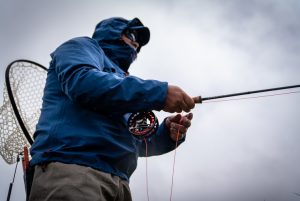
For all species with a C2 license, the Ontario Fishery Regulations set a daily bag restriction of two fish and a possession limit of four. The ability to fish for five or fewer fish, including salmon and trout, is granted by higher license tiers like S5 (for sportspeople).
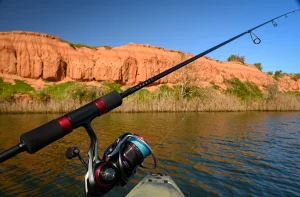
Anglers can keep extra fish per day in addition to the daily bag and possession limitations if they have a valid tag from the Ministry of Natural Resources or another approved provincial or territorial body. Freshwater trout, including lake trout, have a daily bag limit of two per person, but you can only catch rainbow trout and salmon with a license.
Is It Legal To Angle At Night?
The Ontario government has passed legislation that makes night fishing in Ontario illegal. If you are caught out after dark, you could pay a fine of up to $1,000 and serve up to six months in jail for each offense.
The new law also includes a section on how long you can leave your line before taking it down. To clarify, once you take your line down, you cannot use it again until at least four hours have passed.
Having A License For Anglers Is Essential Or Not?
Fisheries regulations vary by region in Ontario, allowing anglers to catch different types of fish depending on where they are fishing. For example, in the Great Lakes region, anglers can only catch trout, bass, and whitefish; in Southern Ontario, they can only catch walleye and sturgeon. In Northern Ontario, they can only target lake trout, Arctic grayling, and Arctic charr.
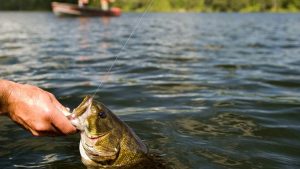
You may not fish on private property without permission from the owner or occupant of the land. If you catch a fish while fishing on private land, it must be returned immediately to its natural habitat or released back into the water unharmed.
However, if you want to fish for salmon or trout, you will need to obtain a license from your local Department of Natural Resources.
How many fishing rods per person are in Illinois?
What Happens If You Angle Without A License?
The Ministry of Natural Resources and Forestry of Ontario maintains stringent regulations regarding fishing licenses. If you are discovered fishing without one, you may be prosecuted for a crime that carries a fine or jail sentence. The maximum penalty is a $25,000 fine and a year in jail.
Any fish or other aquatic life that you caught without a permit may also be taken away by the officer. If no one claims the fish and aquatic life within 30 days following its confiscation, it will be destroyed.
How Much You Will Pay For A Fishing License?
Depending on the size of your party, the Ontario Ministry of Natural Resources and Forestry (MNRF) offers three different classifications of fishing licenses.
A $5 annual fishing license is all that is required if you are fishing with one or more adults. An annual license costs $10 and is required if you’re fishing with adults and kids under 16. The only requirement for fishing with children under 16 is a $10 yearly license.
When purchasing a fishing license, a person under 16 is referred to as a “juvenile” and must have an adult named their “guardian.”
Is It Possible For Using an Online Fishing License?
Certainly. You can show your Ontario fishing license on your phone, but you have to have the App downloaded on your phone. This App is free, and you can easily get it on both iOS and Android platforms.
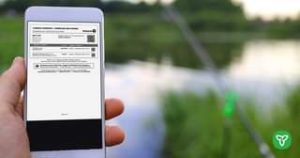
Fishing licenses are required in Ontario. You can purchase a license online or at any Ontario Provincial Police (OPP) office. The cost of a fishing license varies depending on the type of fishing license you purchase and where you live.
Is It Possible To Get An Online Hunting License?
Sure. If you’re interested in purchasing a land-based trout stamp card, which allows access to select OPP lakes during certain times of the year, visit the Ontario Ministry of Natural Resources website or call 811 or 1-877-890-1924 to find out how much it costs before making your purchase.
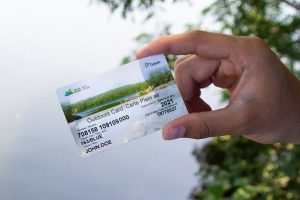
And in case you’re looking to buy an online fishing license, you’ll need your boat registration number and the vehicle identification number (VIN) of your boat.
Who Can Angle Without Having Permits?
Those who are exempt from fishing permits in Ontario include:
– Children under the age of 16, if an adult accompanies them;
– Adults over 65 years old;
– Persons with disabilities;
– Persons who have been certified by a physician as unable to safely fish without the assistance of another person; and
– Those who work at an Ontario Provincial Park or a designated registered campground site.
The Hooks, Lines Is Allowed For Using Fishing Tackle
The hooks, lines, and lures you can use are subject to regulation under the Ontario Recreational Fishing Regulations Summary. Gear limitations may be in effect:
- throughout the province
- within a fishing zone
- only in specific rivers or lakes
- only during specific seasons of the year
There are occasional restrictions on the kind of equipment you can use in particular zones.
Hook and line usage guidelines
These laws are enforceable throughout the province:
- Up to 4 hooks can be attached to your fishing line.
- You may only use one line.
- Depending on where and how you fish, there are certain exceptions.
Ice fishing
You may ice fish with two lines in most waters as long as:
- You maintain a constant distance of 60 meters from any line or tip-up,
- and you always have a clear, unimpeded view of your lines.
Ice Fishing In Ontario
Ice fishing is a little more complicated and is the kind of activity that is much simpler the first time you do it with the help of an expert. It’s crucial to make sure the ice is safe, so if you’re unsure, stay off the ice!
In Ontario, some of the best ice fishing spots are also some of the easiest to get to. In Ontario, Lake Simcoe is a well-liked location for ice fishing. At this time, people enjoy having ice fishing lines and ice fishing tackle for hunting.
Warning: To hunt in Ontario as a non-resident, you must be 16 years of age or older
Remember that the Family Day long weekend in February is a Family Fishing Weekend in Ontario, which entitles you to free (licensable) fishing that weekend.
Conclusion
For fly fishermen seeking multiple species, Ontario is a sizable province with hundreds of rivers available. Most rivers in Ontario are reachable on foot, by boat, by train, or by plane, and they may be found in the heart of the largest cities there as well as in the most distant areas of this enormous province. Ontario is the ideal destination for fly fishers since it has plenty of room, lots of fish, and rivers.
Ontario’s Fishing and Trapping Regulations prohibit the possession, sale, and transportation of any fish that is not alive. The only exception is that you can possess dead fish for personal use (i.e., for bait) and transport dead fish for commercial purposes.
How many fishing rods per person in Ontario, as well as the other rules outlined in this article, are the basics that you need to know. Thank you for taking the time to read this article, and we hope to see you soon.


